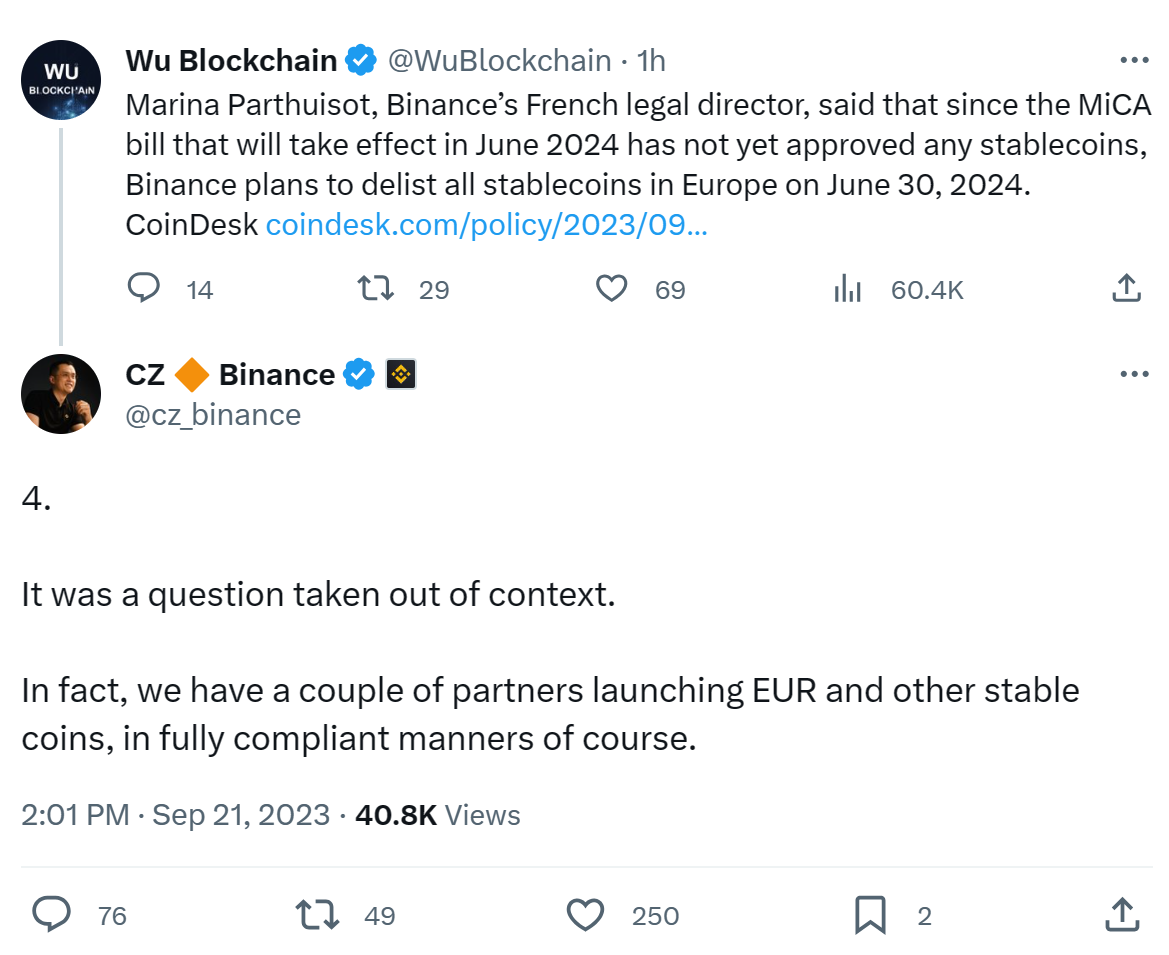EU’s MiCA Regulation Sparks Stablecoin Delisting Warning
The European Union (EU) is poised to enact new regulations that could lead to a widespread delisting of stablecoins, according to a cautionary message delivered by a Binance executive. The impending regulations, known as the Markets in Crypto Assets (MiCA) framework, have left legal experts grappling with uncertainties surrounding their application to decentralized and foreign issuers. Notably, officials from the European Banking Authority (EBA) have stressed that there will be no grace period for cryptocurrencies already in circulation.

MiCA’s Impact on Stablecoins
MiCA, which was finalized in June of last year, is set to establish the EU as the first major jurisdiction worldwide to introduce comprehensive crypto regulations. These regulations will enable exchanges and wallet providers to operate throughout the EU with a single license. However, the specific provisions concerning stablecoins, which are crypto assets tied to other assets like fiat currency or gold, will only take effect in June 2024. In the interim, the finer details are under consultation by the EBA and its sister agency, the European Securities and Markets Authority (ESMA).
Marina Parthuisot, the head of legal at Binance France, issued a stark warning during an online public hearing hosted by the EBA, stating, “We are heading towards a delisting of all stablecoins in Europe on June 30,” as no projects have yet gained approval. She emphasized that this move could significantly impact the European market compared to the rest of the world.
Binance CEO’s Response
In response to this news, Binance CEO Changpeng “CZ” Zhao took to social media to clarify the situation. He mentioned that Binance has “a couple of partners launching EUR and other stablecoins, in fully compliant manners.” Zhao also suggested that Parthuisot’s comments had been taken out of context and used his signature “4” shorthand to allege attacks and fake news.
While Zhao has praised MiCA for introducing clear regulatory guidelines, Binance has already made the decision to withdraw from several European jurisdictions, including the Netherlands, Cyprus, and Germany, due to mounting regulatory pressure. However, Binance is not the only entity facing challenges. Other industry players are grappling with provisions within MiCA that require issuers to be EU-based undertakings. This vague terminology raises questions about whether innovative governance models favored by many blockchain foundations will be excluded.
MiCA Regulations
Thomas Vogel, a partner at the law firm Latham & Watkins, highlighted the dilemma, stating, “A lot of the stablecoin issuers will be, or will purport to be, completely decentralized, therefore without any point of decision or issuance.” This decentralization may hinder their ability to comply with MiCA’s stringent requirements. In contrast, Ian O’Mara, a partner at Matheson law firm, suggested that the rules might permit foreign issuers to register through a crypto provider within the EU, potentially averting fragmentation of major international initiatives such as Circle’s USDC.
Read More: Coinbase Addresses Zcash Hash Power
Nonetheless, EU officials have shown little willingness to offer regulatory flexibility as the rules are already well-established. Elizabeth Noble, team leader for MiCA at the EBA, made it clear that there will be no transitional arrangement for stablecoins, affirming that “The rules will apply from the end of June next year.” Meanwhile, Isabelle Vaillant, director of prudential regulation and supervisory policy at the EBA, acknowledged that concerns over decentralization pose practical challenges but argued that there would always be a contractual link between issuers and customers as a point of contact.



